人教版(2019)必修第三册 Unit 5 The Value of Money情态动词及过去将来时课件(共44张PPT)
文档属性
| 名称 | 人教版(2019)必修第三册 Unit 5 The Value of Money情态动词及过去将来时课件(共44张PPT) |  | |
| 格式 | pptx | ||
| 文件大小 | 3.6MB | ||
| 资源类型 | 教案 | ||
| 版本资源 | 人教版(2019) | ||
| 科目 | 英语 | ||
| 更新时间 | 2023-06-13 14:17:12 | ||
图片预览

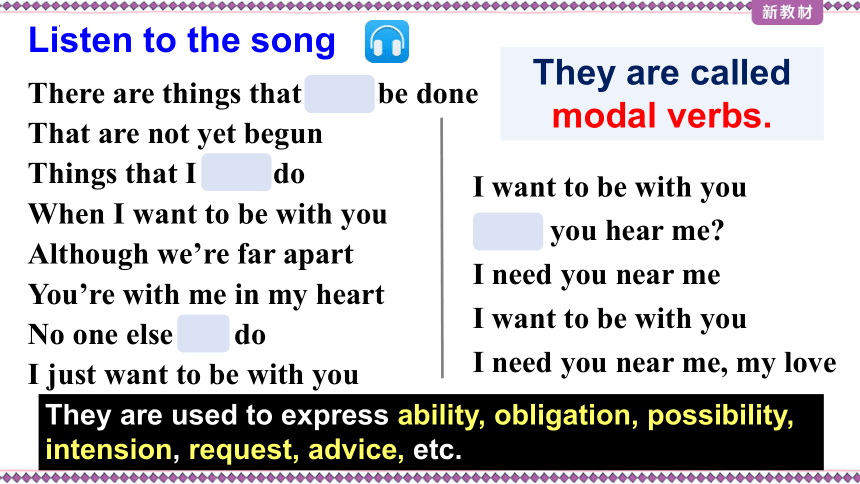
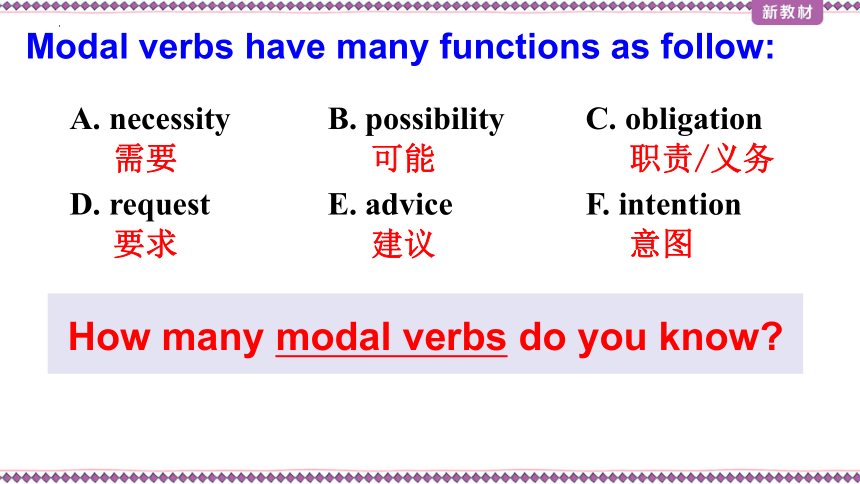
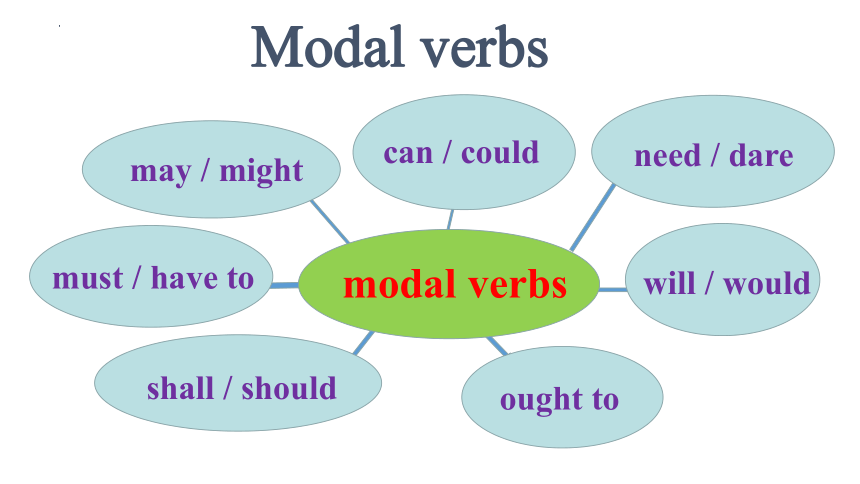
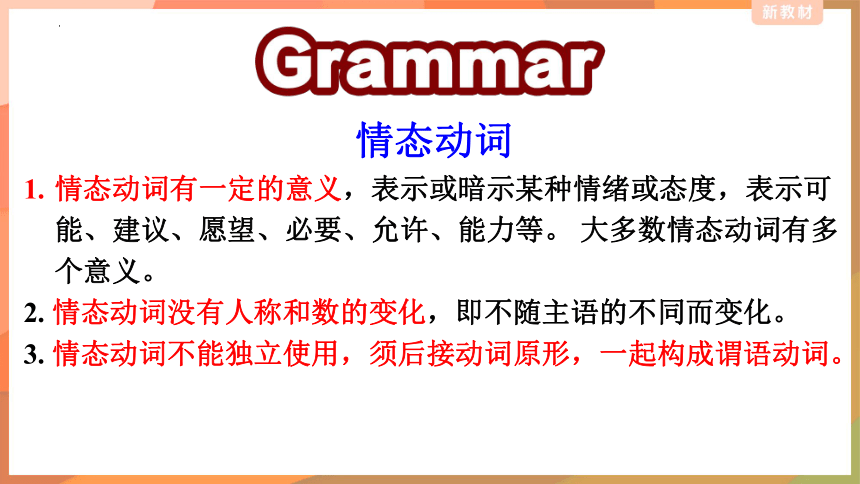
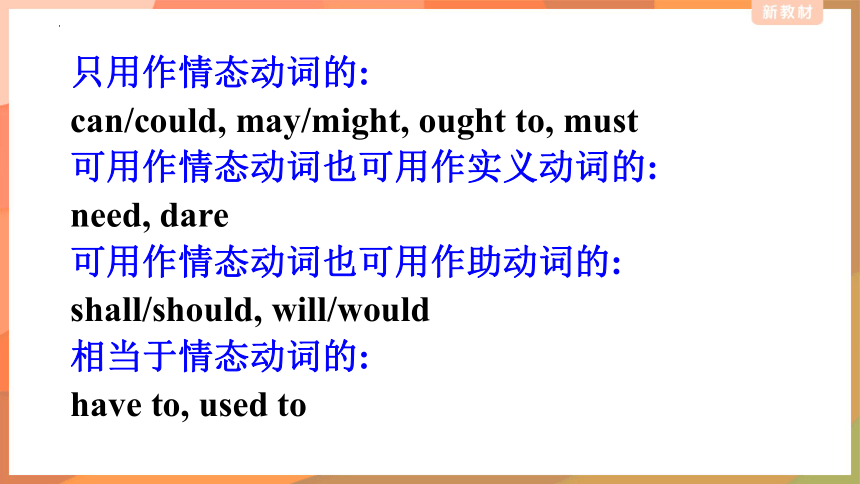
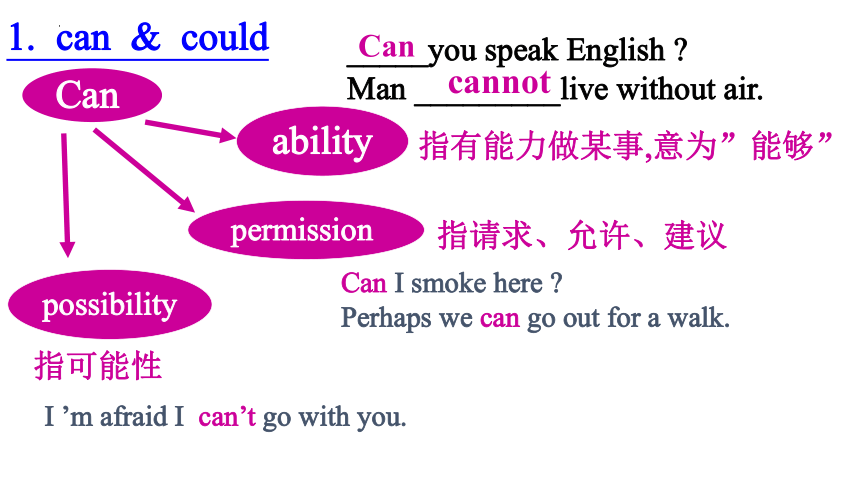
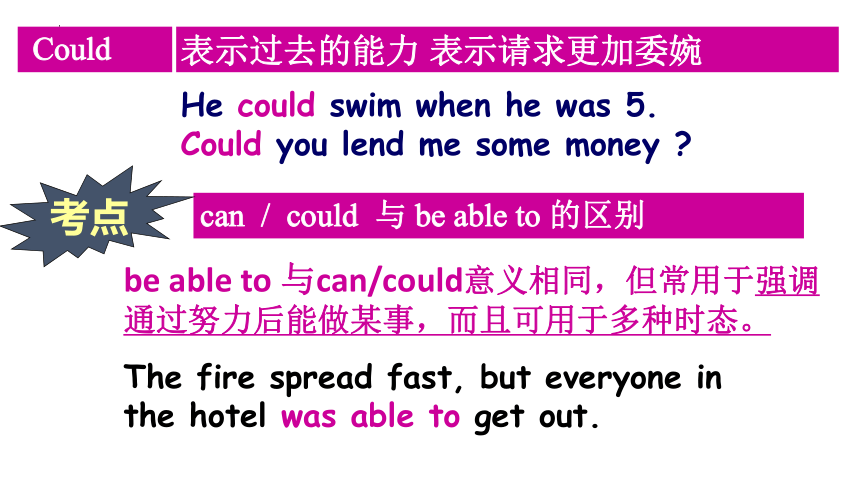
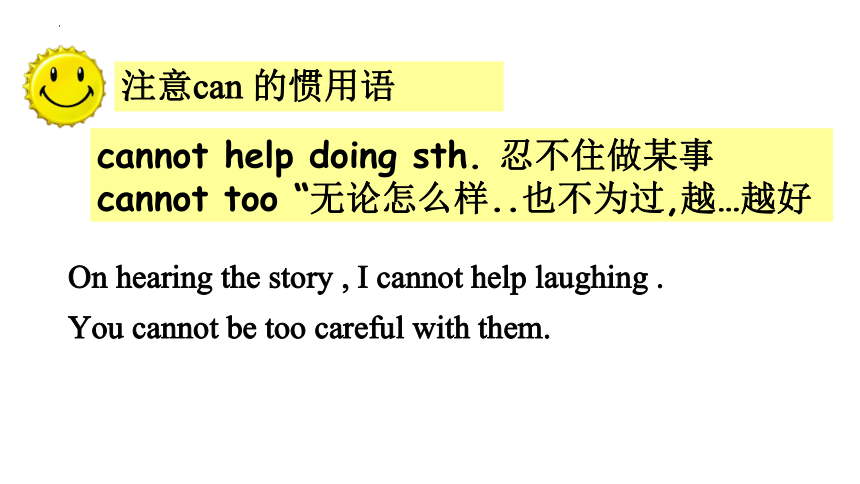
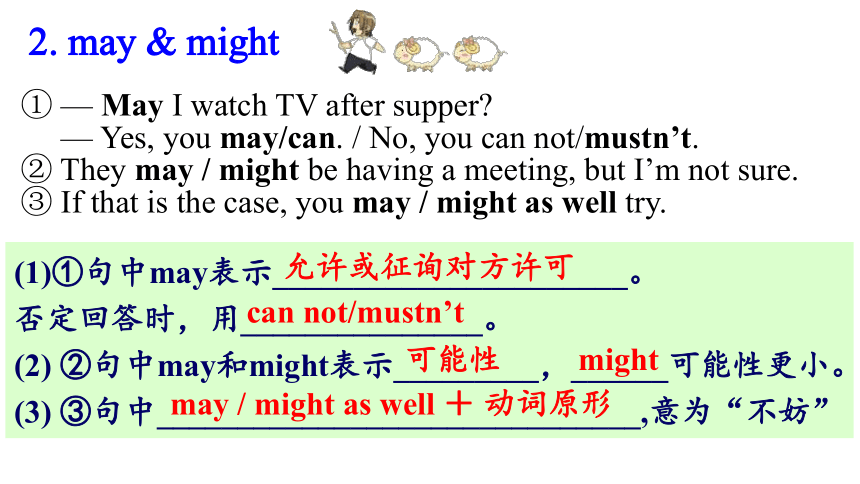

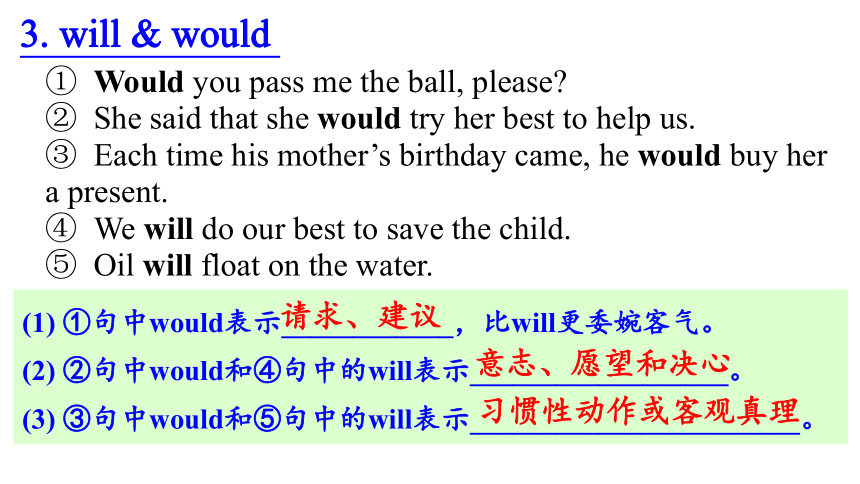
文档简介
(共44张PPT)
UNIT 5
THE VALUE OF MONEY
Express modality and
talk about future events in the past
Listen to the song
There are things that must be done
That are not yet begun
Things that I must do
When I want to be with you
Although we’re far apart
You’re with me in my heart
No one else will do
I just want to be with you
I want to be with you
Can’t you hear me
I need you near me
I want to be with you
I need you near me, my love
They are used to express ability, obligation, possibility, intension, request, advice, etc.
They are called modal verbs.
Modal verbs have many functions as follow:
A. necessity B. possibility C. obligation
D. request E. advice F. intention
How many modal verbs do you know
需要 可能 职责/义务
要求 建议 意图
may / might
must / have to
shall / should
will / would
ought to
need / dare
can / could
Modal verbs
modal verbs
情态动词
情态动词有一定的意义,表示或暗示某种情绪或态度,表示可能、建议、愿望、必要、允许、能力等。 大多数情态动词有多个意义。
2. 情态动词没有人称和数的变化,即不随主语的不同而变化。
3. 情态动词不能独立使用,须后接动词原形,一起构成谓语动词。
只用作情态动词的:
can/could, may/might, ought to, must
可用作情态动词也可用作实义动词的:
need, dare
可用作情态动词也可用作助动词的:
shall/should, will/would
相当于情态动词的:
have to, used to
1. can & could
_____you speak English
Man _________live without air.
Can
cannot
Can I smoke here
Perhaps we can go out for a walk.
I ’m afraid I can’t go with you.
Can
ability
指有能力做某事,意为”能够”
permission
指请求、允许、建议
possibility
指可能性
Could
He could swim when he was 5.
Could you lend me some money
can / could 与 be able to 的区别
be able to 与can/could意义相同,但常用于强调通过努力后能做某事,而且可用于多种时态。
考点
The fire spread fast, but everyone in the hotel was able to get out.
表示过去的能力 表示请求更加委婉
注意can 的惯用语
On hearing the story , I cannot help laughing .
You cannot be too careful with them.
cannot help doing sth. 忍不住做某事
cannot too “无论怎么样..也不为过,越…越好
2. may & might
① — May I watch TV after supper
— Yes, you may/can. / No, you can not/mustn’t.
② They may / might be having a meeting, but I’m not sure.
③ If that is the case, you may / might as well try.
①句中may表示______________________。
否定回答时,用_______________。
(2) ②句中may和might表示_________,______可能性更小。
(3) ③句中______________________________,意为“不妨”
允许或征询对方许可
can not/mustn’t
可能性
might
may / might as well + 动词原形
may 表示祝愿;但语气较正式:
May you succeed!
May you have a good journey!
might 多在间接引语中表示过去的可能和允许。
She said that he might take her bike.
考点
① Would you pass me the ball, please
② She said that she would try her best to help us.
③ Each time his mother’s birthday came, he would buy her a present.
④ We will do our best to save the child.
⑤ Oil will float on the water.
(1) ①句中would表示____________,比will更委婉客气。
(2) ②句中would和④句中的will表示__________________。
(3) ③句中would和⑤句中的will表示_______________________。
请求、建议
意志、愿望和决心
习惯性动作或客观真理
3. will & would
Attention:
would表示过去的习惯性动作时,暗示现在仍然如此;
而used to表示过去常常做某事,强调现在不是这样了。
1. Each time his mother’s birthday came, he would buy her a present.
2. My father used to go to the office by bike when he was young.
考点
【即学即练1】单句语法填空①Some aspects of a pilot's job be boring, and pilots often have to work at inconvenient hours.②They wanted to know how they finish the homework earlier.③Every evening, she sit by the window, deep in thought.④You feel all the training a waste of time, but I'm a hundred percent sure later you'll be grateful you did it.⑤It was really annoying; I get access to the data bank you had recommended.
4. shall & should & ought to
Shall 常用于第一人称,表示征求对方意见或表决心.
Shall we dance
Shall we go by train
I shall go at once.
Shall 用于第二,第三人称中,表示说话人的意愿意志,给对方的警告或命令、决心、威胁等
You shall fail if you don’t work hard. (警告)
He shall be punished. (威胁)
用于法律,条约,规章,等文件中,无论主语人称如何一律用shall
Each student shall arrive at school before 7:15 in the morning.
注意
should & ought to
1. 表示义务或责任, 译为为“应该”。
We should/ought to learn from each other.
2. 表示建议或劝告,译为为“可以,应该”。
You should/ought to try your best to better your performance.
3. 表示推断, 译为”应该”, “可能”, “按道理会”。
They should/ought to be there by now.
4. should表示意外或惊讶,译为“竟然”。
It's strange that he should come so late.
① I have to wait here because I have no umbrella with me.
② I must recite the text this morning.
③ — Must we hand in our exercise books today
— Yes, you must. / No, you don’t have to / you needn’t.
④ You mustn’t smoke here.
⑤ Your mother must be waiting for you now.
⑥ Why must you always interrupt me
(1) ①句中have to和②句中must均表示“______”,但______是指说话人的主观看法,而________则强调客观需要。
(2) ③句中must 所构成的疑问句,回答的否定形式通常为__________________或________,意为“不必要”,而一般不说____________ (④句中mustn’t表示“禁止”)。
5. must & have to
必须
must
have to
needn’t
don’t have to
mustn’t
① I have to wait here because I have no umbrella with me.
② I must recite the text this morning.
③ — Must we hand in our exercise books today
— Yes, you must. / No, you don’t have to / you needn’t.
④ You mustn’t smoke here.
⑤ Your mother must be waiting for you now.
⑥ Why must you always interrupt me
5. must & have to
(3) ______句中must 常表示有根据的、比较确定的推测(只用于肯定的陈述句),译为“一定;必定”。
(4) ⑥句中must表示“____________”。
⑤
偏要;偏偏
【即学即练2】单句语法填空①You be careful with the camera. It costs!②The new law states that people drive after drinking alcohol.③You help your mother with the housework.④It has been announced that candidates remain in their seats until all the papers have been collected.⑤To be a top student, we ought (be) strict with ourselves about everything we do.
① If he dare go, I’ll go with him.
② Tom didn’t dare to do it.
(1) dare作情态动词时,表示“ __________”。常用于否定句和疑问句中,后接动词原形,否定形式为_________。
(2) dare常用作_________ ,有________________的变化,后面可接________________ 。
(3) dare 作为实义动词,有如下搭配:
dare to do sth 敢于做某事
dare sb to do sth 激某人做某事
6. dare & need & had better
敢; 敢于
dare not
实义动词
时态、人称和数
带to的不定式
1.need作情态动词时,后跟动词原形,表示“需要,有必要”,无时态、人称和数的变化,多用于否定句、疑问句或条件句中。
need的用法
You needn't tell him about it this afternoon.
2.由need引出的一般疑问句的肯定回答常用must或have to,而否定回答则常用needn't或don't have to。
—Need I go now —Yes, you must. /No, you needn't.
今天下午你不必把此事告诉他。
3. need还可作实义动词,此时有人称、时态和数的变化,后面接带to 的动词不定式。常用的结构有两个:
need的用法
(1) sb. need(s) to do sth.意为“某人需要做某事”
(2) sth. need(s) doing/to be done 意为“某事/某物需要被……”
doing 用主动形式表示被动,sth.是 do 所表示动作的承受者。
明天我需要早起。
我的自行车需要修理。
I need to get up early tomorrow.
My bike needs mending/to be mended.
① You had better get some sleep.
② You had better not talk with strangers.
had better表示“____________”,使用时常缩写为____________,无人称和数的变化,其否定式一般把not放在had better之______。
had better
最好……
’d better
后
Read the passage and fill in the blanks with suitable modal verbs in the box.
In the film The Million Pound Band Note, Henry Adams is stuck in a foreign country without money and friends, and with nowhere to stay. While this situation ________ seem unusual, it can sometimes happen to travellers. In case it happens to you on a trip abroad, what ________ you do First, and most importantly, you _______ stay calm.
may
should
must
may must can ought to might
had better would should
Fear ________ cause you to become confused. You need to think clearly. Second, you should go to your nearest consulate. They ________ be able to help to some extent. Third, you _________ do well to check with some local charities. They ________ offer help to travellers in need. Fourth, you __________ avoid getting into trouble. You ________ think that stealing some money or food would help you, but you should not do so. Getting caught ________ ruin your life.
can
may must can ought to might
had better would should
ought to
had better
might
would
might
would
2. My wallet was gone. ___________________________________.
(我只可能把它落在了G9公共汽车上。) [2019 天津卷]
1. Jim says we ______ stay in his house as long as we leave it clean and tidy. [2020·全国新高考 I 卷·短文填空]
A. must B. can C. need D. should
I could only have left it on the G9 bus
B
I. 选用括号内合适的内容完成下列对话或句子。
1. —There were five people in the car but they managed to take me as well.
—It _______ (couldn't, mustn't) be a comfortable journey.
2. It's time to say goodbye. _______ (Might, May) you have a good time.
couldn't
May
3. I can't find the key. I ________________ (could have left, must have left) it in the supermarket, but I'm not sure.
4. In today's information age, the loss of data _______ (must, can) cause serious problems for a company.
5. It's strange that he _______ (should, must) have used my bike without my permission.
could have left
can
should
II. 选用方框内合适的内容完成下列句子(每项限用一次)。
can, could, shouldn't, must, may
1. I _______ speak Arabic fluently when I was a child and we lived in Morocco. But after we moved back to Canada, I had very little chance to speak the language and forgot almost everything I knew as a child. Now, I _______ just say a few words in the language.
could
can
2. You __________ leave small objects lying around at home because such objects _______ be swallowed by our children.
3. He has been working for more than 11 hours. He _______ be tired after such hard work. He may prefer to get some rest.
can, could, shouldn't, must, may
shouldn't
may
must
III. 选用括号内合适的内容完成下面对话。
Amanda: Hey, Bob. 1. ________ (Can, Will) I ask you a question Do you have a minute
Bob: Um, I guess so. I've got a class at ten, but I 2. ________ (should, need) have a few minutes. What is it
Can
should
Amanda: Well, I have a second interview for a job tomorrow, and I really 3. ________ (will, should) get ready for it. I 4. ________ (need, may) think about what to ask, you know, about salary or benefits and stuff.
Bob: Yeah. You 5. ________ (can, ought to) think about what you want. You 6. ________ (can, will) make a list.
should
need
ought to
can
Amanda: OK. 7. ________ (Would, May) you help me I've got my laptop. Oh, it 8. ________ (won't, shouldn't) turn on.
Bob: You 9. __________ (had better, may) plug it in. OK, so let's see ... Do they provide health insurance
Amanda: Oh, I hope so. They 10. ________ (can, might) have it. Don't all companies offer some help with insurance
Would
won't
had better
might
过去将来时( The Past Future Tense)
过去将来时表示在过去某一时间将要发生的动作或存在的状态。过去将来时常用在主句谓语动词为过去时态的宾语从句中。过去将来时句子中有时包含时间状语 the next day, soon等。
过去将来时的基本结构是“woud+动词原形”, 否定式是在woud后面加not。如:
Jeff knew he would be tired the next day.
杰夫知道他第二天会很累。
He promised that he would not open the letter until 2 o’clock.
他许诺两点钟之前不会打开信。
be going to, be about to等结构也用在过去将来时中, 如:
They were going to find someone to take part in their bet when they saw Henry walking on the street outside.
他们正准备找一个人来参与他们的赌局, 这时,他们看到亨利走在外面的大街上。
Mrs Thomson was about to sit down to watch the opera when her phone rang.
汤姆森夫人刚要坐下看剧的时候, 她的电话响了。
1. be going to表示事先经过考虑或事先做好安排,而will则表示没有经过事先考虑,只是在说话时做出的决定。如:
What are you going to do when you grow up
There’s someone at the door. I’ll go and open it.
2. will可用来表示事物的倾向性或规律性,而be going to则没有这种用法。如:
People won’t live without water.
be going to 和 will
3. 表示将来意义的will不可用在条件状语从句中,但可以用在带条件状语从句的主句中。will表示“意愿”时可以用在条件句中。如:
If you are going to join us, we will wait for you.
If you will give me a hand, I’ll tell you what happened. (第一个will在此表意愿)
4. 强调从目前的证据或迹象推测可能发生某事时,常用be going to。如:
What bad weather! It is going to rain.
Both “would do” and “was/were going to do” can be used to talk about future events or intentions in the past.
Complete the following sentences that describe the future using either form of the given verbs.
1. Philip bought two tickets for The Phantom of the Opera. He ______________________________ (watch) this musical with his girlfriend on the weekend.
2. I was so surprised at the news that David ________________ _________________ (play) the role of the dinosaur in the play that I gave him a hug out of joy.
would watch / was going to watch
would play /
was going to play
3. Lily decided that she ______________________________ (settle) in New York and pursue her dream of becoming an actress.
4. Hey, Timmy. I _______________ (call) you. But now that you are here, I don't have to.
5. The competition was so close that no one was sure who ___________ (win) the Best Actor award.
6. Jim is not here right now. He said he ______________________ (be) on duty at the library this afternoon.
would settle / was going to settle
was going to call
would win
would be / was going to be
When twelve-year-old John Wilson walked into his chemistry class on a rainy day in 1931, he had no way of knowing that his life ______________ (change) completely. [2020江苏]
After running hundreds of tests, the researchers noted that the monkeys _________ (go) for the higher values more than half the time… [2019全国卷III]
was to change
would go
1. —The plane is leaving right now, but Kevin hasn’t arrived yet.
—Well, he said he __________ (be) here on time.
2. Our TV sets sell well, but ten years ago no one could have imagined such a big share in the market that we __________ (have).
3. My brother had planned to see me off at the airport, but he didn’t, because he _________________ (attend)an important conference.
would be
were to have
was going to attend
UNIT 5
THE VALUE OF MONEY
Express modality and
talk about future events in the past
Listen to the song
There are things that must be done
That are not yet begun
Things that I must do
When I want to be with you
Although we’re far apart
You’re with me in my heart
No one else will do
I just want to be with you
I want to be with you
Can’t you hear me
I need you near me
I want to be with you
I need you near me, my love
They are used to express ability, obligation, possibility, intension, request, advice, etc.
They are called modal verbs.
Modal verbs have many functions as follow:
A. necessity B. possibility C. obligation
D. request E. advice F. intention
How many modal verbs do you know
需要 可能 职责/义务
要求 建议 意图
may / might
must / have to
shall / should
will / would
ought to
need / dare
can / could
Modal verbs
modal verbs
情态动词
情态动词有一定的意义,表示或暗示某种情绪或态度,表示可能、建议、愿望、必要、允许、能力等。 大多数情态动词有多个意义。
2. 情态动词没有人称和数的变化,即不随主语的不同而变化。
3. 情态动词不能独立使用,须后接动词原形,一起构成谓语动词。
只用作情态动词的:
can/could, may/might, ought to, must
可用作情态动词也可用作实义动词的:
need, dare
可用作情态动词也可用作助动词的:
shall/should, will/would
相当于情态动词的:
have to, used to
1. can & could
_____you speak English
Man _________live without air.
Can
cannot
Can I smoke here
Perhaps we can go out for a walk.
I ’m afraid I can’t go with you.
Can
ability
指有能力做某事,意为”能够”
permission
指请求、允许、建议
possibility
指可能性
Could
He could swim when he was 5.
Could you lend me some money
can / could 与 be able to 的区别
be able to 与can/could意义相同,但常用于强调通过努力后能做某事,而且可用于多种时态。
考点
The fire spread fast, but everyone in the hotel was able to get out.
表示过去的能力 表示请求更加委婉
注意can 的惯用语
On hearing the story , I cannot help laughing .
You cannot be too careful with them.
cannot help doing sth. 忍不住做某事
cannot too “无论怎么样..也不为过,越…越好
2. may & might
① — May I watch TV after supper
— Yes, you may/can. / No, you can not/mustn’t.
② They may / might be having a meeting, but I’m not sure.
③ If that is the case, you may / might as well try.
①句中may表示______________________。
否定回答时,用_______________。
(2) ②句中may和might表示_________,______可能性更小。
(3) ③句中______________________________,意为“不妨”
允许或征询对方许可
can not/mustn’t
可能性
might
may / might as well + 动词原形
may 表示祝愿;但语气较正式:
May you succeed!
May you have a good journey!
might 多在间接引语中表示过去的可能和允许。
She said that he might take her bike.
考点
① Would you pass me the ball, please
② She said that she would try her best to help us.
③ Each time his mother’s birthday came, he would buy her a present.
④ We will do our best to save the child.
⑤ Oil will float on the water.
(1) ①句中would表示____________,比will更委婉客气。
(2) ②句中would和④句中的will表示__________________。
(3) ③句中would和⑤句中的will表示_______________________。
请求、建议
意志、愿望和决心
习惯性动作或客观真理
3. will & would
Attention:
would表示过去的习惯性动作时,暗示现在仍然如此;
而used to表示过去常常做某事,强调现在不是这样了。
1. Each time his mother’s birthday came, he would buy her a present.
2. My father used to go to the office by bike when he was young.
考点
【即学即练1】单句语法填空①Some aspects of a pilot's job be boring, and pilots often have to work at inconvenient hours.②They wanted to know how they finish the homework earlier.③Every evening, she sit by the window, deep in thought.④You feel all the training a waste of time, but I'm a hundred percent sure later you'll be grateful you did it.⑤It was really annoying; I get access to the data bank you had recommended.
4. shall & should & ought to
Shall 常用于第一人称,表示征求对方意见或表决心.
Shall we dance
Shall we go by train
I shall go at once.
Shall 用于第二,第三人称中,表示说话人的意愿意志,给对方的警告或命令、决心、威胁等
You shall fail if you don’t work hard. (警告)
He shall be punished. (威胁)
用于法律,条约,规章,等文件中,无论主语人称如何一律用shall
Each student shall arrive at school before 7:15 in the morning.
注意
should & ought to
1. 表示义务或责任, 译为为“应该”。
We should/ought to learn from each other.
2. 表示建议或劝告,译为为“可以,应该”。
You should/ought to try your best to better your performance.
3. 表示推断, 译为”应该”, “可能”, “按道理会”。
They should/ought to be there by now.
4. should表示意外或惊讶,译为“竟然”。
It's strange that he should come so late.
① I have to wait here because I have no umbrella with me.
② I must recite the text this morning.
③ — Must we hand in our exercise books today
— Yes, you must. / No, you don’t have to / you needn’t.
④ You mustn’t smoke here.
⑤ Your mother must be waiting for you now.
⑥ Why must you always interrupt me
(1) ①句中have to和②句中must均表示“______”,但______是指说话人的主观看法,而________则强调客观需要。
(2) ③句中must 所构成的疑问句,回答的否定形式通常为__________________或________,意为“不必要”,而一般不说____________ (④句中mustn’t表示“禁止”)。
5. must & have to
必须
must
have to
needn’t
don’t have to
mustn’t
① I have to wait here because I have no umbrella with me.
② I must recite the text this morning.
③ — Must we hand in our exercise books today
— Yes, you must. / No, you don’t have to / you needn’t.
④ You mustn’t smoke here.
⑤ Your mother must be waiting for you now.
⑥ Why must you always interrupt me
5. must & have to
(3) ______句中must 常表示有根据的、比较确定的推测(只用于肯定的陈述句),译为“一定;必定”。
(4) ⑥句中must表示“____________”。
⑤
偏要;偏偏
【即学即练2】单句语法填空①You be careful with the camera. It costs!②The new law states that people drive after drinking alcohol.③You help your mother with the housework.④It has been announced that candidates remain in their seats until all the papers have been collected.⑤To be a top student, we ought (be) strict with ourselves about everything we do.
① If he dare go, I’ll go with him.
② Tom didn’t dare to do it.
(1) dare作情态动词时,表示“ __________”。常用于否定句和疑问句中,后接动词原形,否定形式为_________。
(2) dare常用作_________ ,有________________的变化,后面可接________________ 。
(3) dare 作为实义动词,有如下搭配:
dare to do sth 敢于做某事
dare sb to do sth 激某人做某事
6. dare & need & had better
敢; 敢于
dare not
实义动词
时态、人称和数
带to的不定式
1.need作情态动词时,后跟动词原形,表示“需要,有必要”,无时态、人称和数的变化,多用于否定句、疑问句或条件句中。
need的用法
You needn't tell him about it this afternoon.
2.由need引出的一般疑问句的肯定回答常用must或have to,而否定回答则常用needn't或don't have to。
—Need I go now —Yes, you must. /No, you needn't.
今天下午你不必把此事告诉他。
3. need还可作实义动词,此时有人称、时态和数的变化,后面接带to 的动词不定式。常用的结构有两个:
need的用法
(1) sb. need(s) to do sth.意为“某人需要做某事”
(2) sth. need(s) doing/to be done 意为“某事/某物需要被……”
doing 用主动形式表示被动,sth.是 do 所表示动作的承受者。
明天我需要早起。
我的自行车需要修理。
I need to get up early tomorrow.
My bike needs mending/to be mended.
① You had better get some sleep.
② You had better not talk with strangers.
had better表示“____________”,使用时常缩写为____________,无人称和数的变化,其否定式一般把not放在had better之______。
had better
最好……
’d better
后
Read the passage and fill in the blanks with suitable modal verbs in the box.
In the film The Million Pound Band Note, Henry Adams is stuck in a foreign country without money and friends, and with nowhere to stay. While this situation ________ seem unusual, it can sometimes happen to travellers. In case it happens to you on a trip abroad, what ________ you do First, and most importantly, you _______ stay calm.
may
should
must
may must can ought to might
had better would should
Fear ________ cause you to become confused. You need to think clearly. Second, you should go to your nearest consulate. They ________ be able to help to some extent. Third, you _________ do well to check with some local charities. They ________ offer help to travellers in need. Fourth, you __________ avoid getting into trouble. You ________ think that stealing some money or food would help you, but you should not do so. Getting caught ________ ruin your life.
can
may must can ought to might
had better would should
ought to
had better
might
would
might
would
2. My wallet was gone. ___________________________________.
(我只可能把它落在了G9公共汽车上。) [2019 天津卷]
1. Jim says we ______ stay in his house as long as we leave it clean and tidy. [2020·全国新高考 I 卷·短文填空]
A. must B. can C. need D. should
I could only have left it on the G9 bus
B
I. 选用括号内合适的内容完成下列对话或句子。
1. —There were five people in the car but they managed to take me as well.
—It _______ (couldn't, mustn't) be a comfortable journey.
2. It's time to say goodbye. _______ (Might, May) you have a good time.
couldn't
May
3. I can't find the key. I ________________ (could have left, must have left) it in the supermarket, but I'm not sure.
4. In today's information age, the loss of data _______ (must, can) cause serious problems for a company.
5. It's strange that he _______ (should, must) have used my bike without my permission.
could have left
can
should
II. 选用方框内合适的内容完成下列句子(每项限用一次)。
can, could, shouldn't, must, may
1. I _______ speak Arabic fluently when I was a child and we lived in Morocco. But after we moved back to Canada, I had very little chance to speak the language and forgot almost everything I knew as a child. Now, I _______ just say a few words in the language.
could
can
2. You __________ leave small objects lying around at home because such objects _______ be swallowed by our children.
3. He has been working for more than 11 hours. He _______ be tired after such hard work. He may prefer to get some rest.
can, could, shouldn't, must, may
shouldn't
may
must
III. 选用括号内合适的内容完成下面对话。
Amanda: Hey, Bob. 1. ________ (Can, Will) I ask you a question Do you have a minute
Bob: Um, I guess so. I've got a class at ten, but I 2. ________ (should, need) have a few minutes. What is it
Can
should
Amanda: Well, I have a second interview for a job tomorrow, and I really 3. ________ (will, should) get ready for it. I 4. ________ (need, may) think about what to ask, you know, about salary or benefits and stuff.
Bob: Yeah. You 5. ________ (can, ought to) think about what you want. You 6. ________ (can, will) make a list.
should
need
ought to
can
Amanda: OK. 7. ________ (Would, May) you help me I've got my laptop. Oh, it 8. ________ (won't, shouldn't) turn on.
Bob: You 9. __________ (had better, may) plug it in. OK, so let's see ... Do they provide health insurance
Amanda: Oh, I hope so. They 10. ________ (can, might) have it. Don't all companies offer some help with insurance
Would
won't
had better
might
过去将来时( The Past Future Tense)
过去将来时表示在过去某一时间将要发生的动作或存在的状态。过去将来时常用在主句谓语动词为过去时态的宾语从句中。过去将来时句子中有时包含时间状语 the next day, soon等。
过去将来时的基本结构是“woud+动词原形”, 否定式是在woud后面加not。如:
Jeff knew he would be tired the next day.
杰夫知道他第二天会很累。
He promised that he would not open the letter until 2 o’clock.
他许诺两点钟之前不会打开信。
be going to, be about to等结构也用在过去将来时中, 如:
They were going to find someone to take part in their bet when they saw Henry walking on the street outside.
他们正准备找一个人来参与他们的赌局, 这时,他们看到亨利走在外面的大街上。
Mrs Thomson was about to sit down to watch the opera when her phone rang.
汤姆森夫人刚要坐下看剧的时候, 她的电话响了。
1. be going to表示事先经过考虑或事先做好安排,而will则表示没有经过事先考虑,只是在说话时做出的决定。如:
What are you going to do when you grow up
There’s someone at the door. I’ll go and open it.
2. will可用来表示事物的倾向性或规律性,而be going to则没有这种用法。如:
People won’t live without water.
be going to 和 will
3. 表示将来意义的will不可用在条件状语从句中,但可以用在带条件状语从句的主句中。will表示“意愿”时可以用在条件句中。如:
If you are going to join us, we will wait for you.
If you will give me a hand, I’ll tell you what happened. (第一个will在此表意愿)
4. 强调从目前的证据或迹象推测可能发生某事时,常用be going to。如:
What bad weather! It is going to rain.
Both “would do” and “was/were going to do” can be used to talk about future events or intentions in the past.
Complete the following sentences that describe the future using either form of the given verbs.
1. Philip bought two tickets for The Phantom of the Opera. He ______________________________ (watch) this musical with his girlfriend on the weekend.
2. I was so surprised at the news that David ________________ _________________ (play) the role of the dinosaur in the play that I gave him a hug out of joy.
would watch / was going to watch
would play /
was going to play
3. Lily decided that she ______________________________ (settle) in New York and pursue her dream of becoming an actress.
4. Hey, Timmy. I _______________ (call) you. But now that you are here, I don't have to.
5. The competition was so close that no one was sure who ___________ (win) the Best Actor award.
6. Jim is not here right now. He said he ______________________ (be) on duty at the library this afternoon.
would settle / was going to settle
was going to call
would win
would be / was going to be
When twelve-year-old John Wilson walked into his chemistry class on a rainy day in 1931, he had no way of knowing that his life ______________ (change) completely. [2020江苏]
After running hundreds of tests, the researchers noted that the monkeys _________ (go) for the higher values more than half the time… [2019全国卷III]
was to change
would go
1. —The plane is leaving right now, but Kevin hasn’t arrived yet.
—Well, he said he __________ (be) here on time.
2. Our TV sets sell well, but ten years ago no one could have imagined such a big share in the market that we __________ (have).
3. My brother had planned to see me off at the airport, but he didn’t, because he _________________ (attend)an important conference.
would be
were to have
was going to attend
